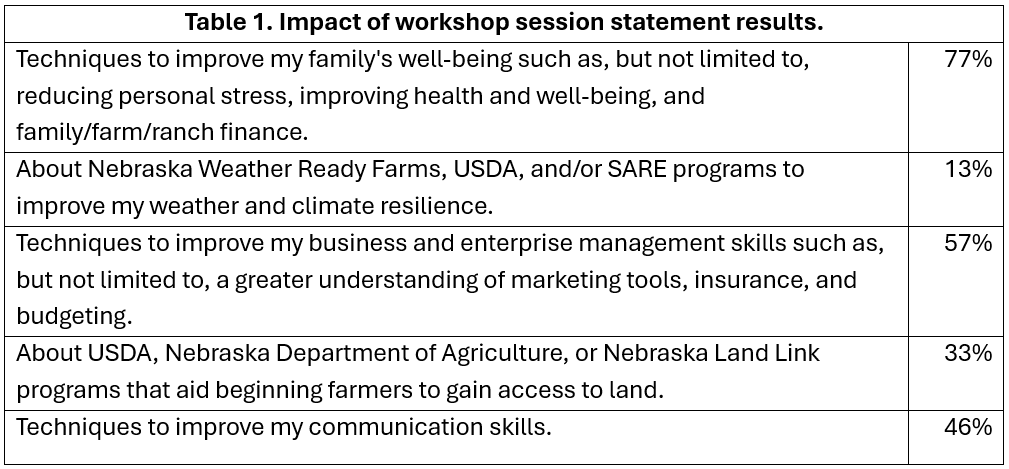Cornhusker Economics March 27, 2024
Nebraska Women In Agriculture Conference Marks 39 Years
By Ryan Evans, Sarah Treffer, and Jessica Groskopf Nebraska Extension
KEARNEY, NEB. — The Nebraska Women in Agriculture program marked 39 years of educating and empowering females in farming, ranching, and agribusiness, with nearly 380 people attending its annual conference on February 22 and 23 in Kearney.
For the second year in a row, a pre-conference session was held on Wednesday, February 21, focusing on business entity selection. The pre-conference was a 5.5-hour in-depth session with Katie Samples Dean, an attorney, and Sheila Hanson, a Certified Public Accountant.
The main conference included 25 workshops, five keynotes, and other activities to help attendees learn how to better manage risk, improve their farms and ranches, and become more successful operators and business partners. Keynote speakers included Dr. David Kohl, Rosemary Anderson, Ashley Machado, Sarah Greer, and John Noltner. This year’s conference offered workshop sessions on agricultural leases, livestock health and marketing, land management, estate and succession planning, mental health, and other topics.
People attending the conference represented a wide variety of agricultural backgrounds and demographics. At the time of this article, 144 responses to the conference survey had been entered (n=144). Ninety-six percent of the respondents identified as female, 96% as white, and 85% as non-Hispanic/Latino. Ninety-five percent of participants resided in Nebraska. Figure 1 shows the roles and ages of those who participated.

Figure 1: Age and Roles of 2024 Nebraska Women in Agriculture Conference attendees.
The goal of this year’s conference was to specifically provide education in the areas of human resources, production, and financial risk management for female producers.
Survey respondents were asked to choose the statement or statements that best reflect their experience: “As a result of attending this conference I learned…” The response options and percentage of survey respondents for each option are listed in Table 1.

The conference depends on continued funding from grant agencies and supporters. This year’s pre-conference was supported by a Nebraska Sustainable Agricultural Research Mini-Grant, and the main conference was supported by a grant from the North Central Extension Risk Management Education Center. Additional supporters included Doug Jose, the Nebraska Soybean Board, Nebraska Corn Board, Farm Credit Services of America, Nebraska Farm Bureau, Nebraska Grazing Lands Coalition, Nebraska Dry Bean Commission, and the Nature Conservancy. There were various other agricultural businesses and government organizations who participated in our exhibit space.
Beginning in May, the Women in Agriculture program will partner with the Center for Agricultural Profitability’s weekly webinar series to highlight some of the conference’s top speakers. The four-session series will take place May 16, June 20, July 18, and August 15, at noon Central time. These webinars will be free, and open for anyone to participate.
“After nearly 40 years, the conference continues to grow and gain support, which has really helped freshen the offerings each year in response to changing conditions in the ag industry,” said Jessica Groskopf, an extension educator and director of the Nebraska Women in Agriculture program.
The Nebraska Women in Agriculture Conference will celebrate 40 years during next year’s conference, Feb. 20-21, 2025, in Kearney. For more about the program, visit https://wia.unl.edu or follow us on Facebook, Instagram, and Twitter, @newomeninag.
--
Ryan Evans is a communications specialist with the University of Nebraska-Lincoln’s Center for Agricultural Profitability.
Sarah Treffer is a marketing and communications intern with the Nebraska Women in Agriculture program.
Jessica Groskopf is the director of the Nebraska Women in Agriculture Program and regional extension economist with the University of Nebraska-Lincoln’s Center for Agricultural Profitability.